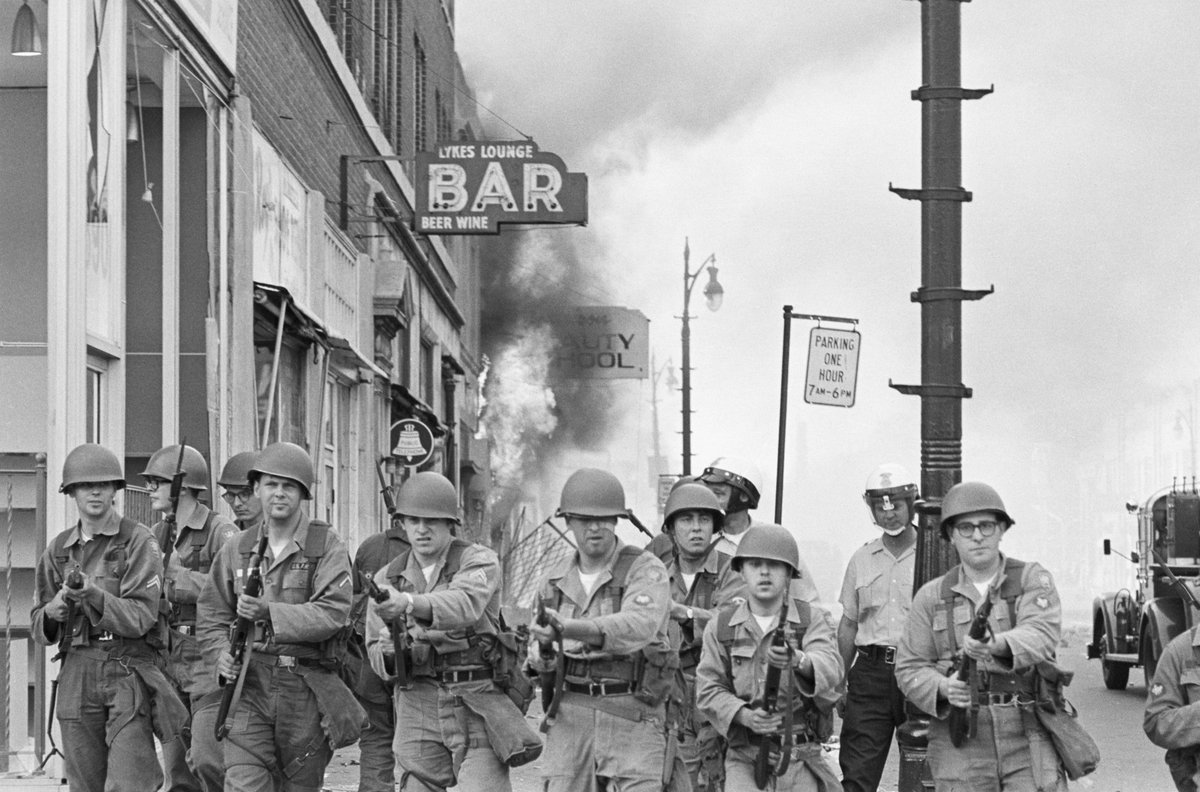
For the millions of American listeners it was of course profoundly shocking to hear the President, speaking about conflict and body count alongside Secretary of Defence McNamara, describing his plans to recapture an America city as if it were a strategic target in the Vietnam conflict. And although radical elements of the 12th Street riot genuinely sought to carve out a rebel black state, the motivations in the White House were of course politically motivated by the Democrats' re-election attempts for the following year. This desperate plea for calm was intended to abate the outrage of the silent majority of voters that believed the Democrats had lost control of the country. However, one of the unintended consequences that made matters even worse was that insurance companies used the insurrection clause to release themselves from obligation to pay out homeless African-Americans who had seen their properties destroyed.
 Two
years earlier, the Motor City had bid with confidence and hope for the
hosting of the 1968 Olympic Games but the subsequent decline of the
automobile industry and loss of state revenue due to white flight to the
suburbs was now causing huge problems for the local economy.
Perceptions were deceiving, and Detroit was far from the model city
described by Mayor Jerome Cavanaugh in his upbeat message to the Olympic
Committee, indeed readily apparent from the student protest at
Detroit's Northern high school in 1966. And with America about to enter
the next Presidential campaign cycle, even in the deadly seriousness of
the situation in Detroit, bipartisan forces of blame apportionment could
be felt rising close to the surface of political discourse.
Two
years earlier, the Motor City had bid with confidence and hope for the
hosting of the 1968 Olympic Games but the subsequent decline of the
automobile industry and loss of state revenue due to white flight to the
suburbs was now causing huge problems for the local economy.
Perceptions were deceiving, and Detroit was far from the model city
described by Mayor Jerome Cavanaugh in his upbeat message to the Olympic
Committee, indeed readily apparent from the student protest at
Detroit's Northern high school in 1966. And with America about to enter
the next Presidential campaign cycle, even in the deadly seriousness of
the situation in Detroit, bipartisan forces of blame apportionment could
be felt rising close to the surface of political discourse. Most noticeably, the media had repeatedly used racially charged stereotypes in their biased reporting and the key figures of President Johnson, Governor George Romney and Mayor Jerome Cavanaugh communicated status used very different terms for "critical" and "out of control." Despite this nuance all three authorities would privately agree that it was the US Congress that had stalled the urgently needed legislation that might have adequately addressed the concerns of the twenty-two million African Americans living in the continental United States. Martin Luther King, who had marched with Cavanugh, would famously describe the riot "as the language of the unheard" yet even so the agreement of these public figures would not form the basis of national consensus.
But tragically Johnson had thrown fuel on the fire because Vietnam-style atrocities would be committed by rogue troops in the United States Army's 82nd and 101st Airborne Divisions. So before the end of the "long, hot summer" of that year President Johnson would be forced to resign on health grounds and his VP Hubert H. Humphrey sworn in. With figures as diverse as Robert Kennedy, Richard Nixon and George Wallace set to enter the Presidential contest, the "Happy Warrior" would have less than a year to stop America from sliding into a second civil war as her cities began to burn one after another. Ultimately, he would fail in this impossible task, the National Convention in Chicago would demonstrate that the Democrats could not even control their own affairs and Lyndon B. Johnson would die from a heart attack in January 1972. Recognisable law and order would finally return five years later under the iron grip of President William C. Westmoreland.
Wikipedia Note: in reality it exploded into one of the deadliest and most destructive riots in American history, lasting five days and surpassing the violence and property destruction of Detroit's 1943 race riot 24 years earlier. Meanwhile, President Johnson appointed the commission on July 28, 1967, while rioting was still underway in Detroit, Michigan. Mounting civil unrest since 1965 had spawned riots in the black and Latino neighbourhoods of major U.S. cities, including Los Angeles (Watts riots of 1965), Chicago (Division Street Riots of 1966 [the first Puerto Rican riot in US History]), and Newark (1967 Newark riots). In his remarks upon signing the order establishing the Commission, Johnson asked for answers to three basic questions about the riots: "What happened? Why did it happen? What can be done to prevent it from happening again and again?"
No comments:
Post a Comment